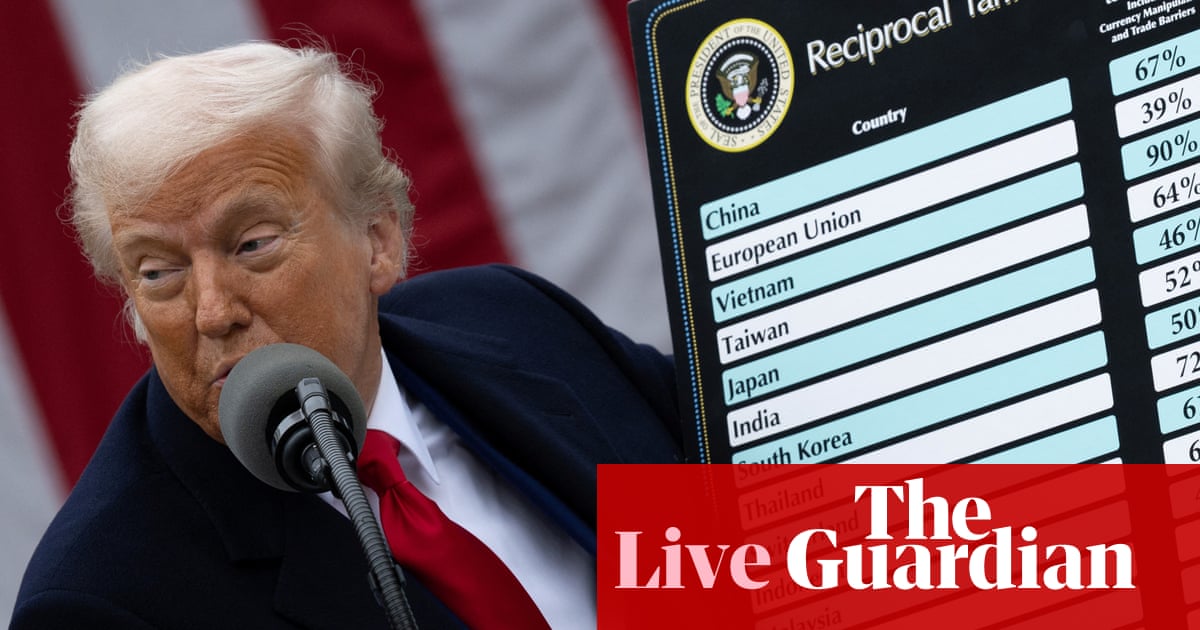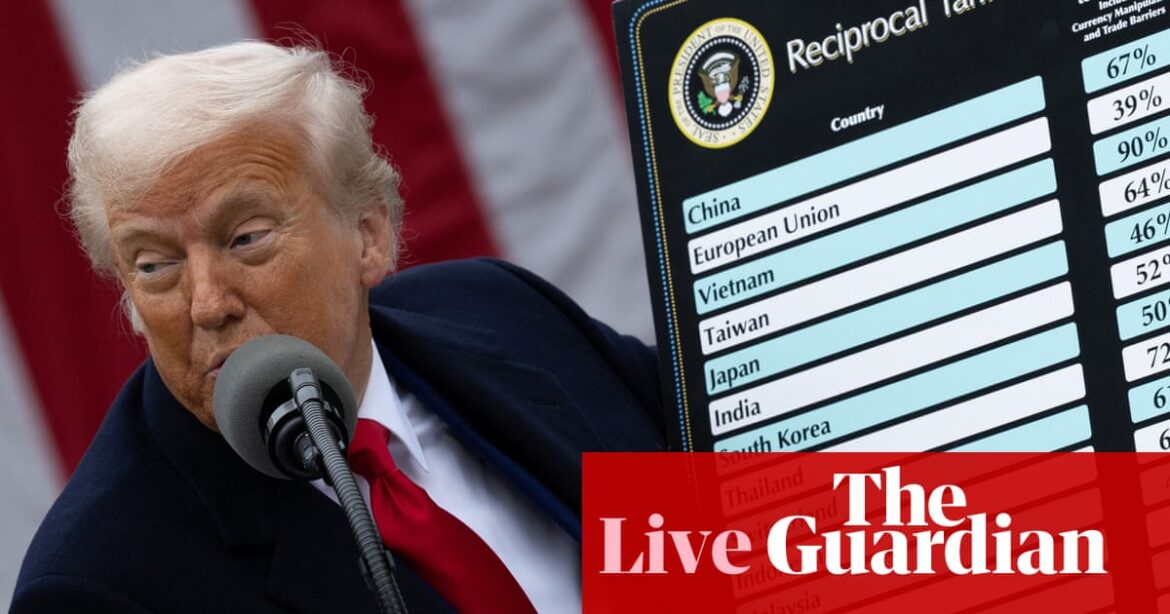
The initial 10% “baseline” tariff took effect at US seaports, airports and customs warehouses at 12.01am ET (0401 GMT). Many other countries will see their tariff rates increase above that next week – including the EU, which will be hit with a 20% rate. A 25% tariff imposed on all foreign cars imported into the US came into effect on Thursday.
Jaguar Land Rover (JLR) has confirmed it will “pause” shipments to the US in April as it works to “address the new trading terms” of Donald Trump’s tariffs.
The UK prime minister, Keir Starmer, is expected to spend the weekend speaking to foreign leaders about the tariffs, after calls with the prime ministers of Australia and Italy on Friday in which the leaders agreed that a trade war would be “extremely damaging”.
Downing Street said that Starmer had “been clear the UK’s response will be guided by the national interest”. A spokesperson said officials will “calmly continue with our preparatory work, rather than rush to retaliate”.
Ralph Goodale, the high commissioner for Canada in the UK, told the BBC’s Radio 4 Today programme on Saturday that “action taken by the US government is completely illogical”. He added: “It will damage the United States itself.”
The Italian economy minister, Giancarlo Giorgetti, warned on Saturday against the imposition of retaliatory tariffs on the US in response to Trump’s announcement of sweeping tariffs on trade partners. Speaking at a business forum near Milan, Giorgetti said Italy was aiming for a “de-escalation” with the US. “We should avoid launching a policy of counter-tariffs that could be damaging for everyone and especially for us,” Giorgetti said.
The stock market plunge has more to do with the emergence this year of China’s DeepSeek artificial intelligence tool than with Trump’s policies, the US treasury secretary, Scott Bessent, said in an interview released on Friday that signalled little concern about the ongoing nosedive. “For everyone who thinks these market declines are all based on the president’s economic policies, I can tell you that this market decline started with the Chinese AI announcement of DeepSeek,” Bessent told former Fox News host Tucker Carlson.
Bangladesh’s interim leader called an emergency meeting on Saturday after textile leaders in the world’s second-largest garment manufacturing nation said US tariffs were a “massive blow” to the key industry. Trump on Wednesday slapped punishing new tariffs of 37 % on Bangladesh, increasing duties from the previous 16% on cotton and 32% on polyester products.
The Israeli prime minister, Benjamin Netanyahu, is expected to visit the White House on Monday to discuss recently announced tariffs with Trump, three Israeli officials said on Saturday. As part of a sweeping new tariff policy announced by Trump, unspecified Israeli goods exports to the US face a 17% tariff.
China has taken and will continue to take resolute measures to safeguard its sovereignty, security and development interests, the foreign ministry said on Saturday, citing a Chinese government stance on opposing US tariffs. The US should “stop using tariffs as a weapon to suppress China’s economy and trade, and stop undermining the legitimate development rights of the Chinese people”, the ministry said.
Nissan Motor is considering shifting some domestic production of US-bound vehicles to the US, the Nikkei reported on Saturday. As early as this summer, Nissan plans to reduce production at its Fukuoka factory in western Japan and shift some manufacturing of its Rogue SUV to the US to mitigate the impact of Trump’s tariffs, the business newspaper said, without citing the source of its information.
The president of Taiwan, Lai Ching-te, met tech executives on Saturday to discuss how to respond to new US tariffs, promising to ensure Taiwan’s global competitiveness and safeguard its interests. Lai met the executives at his official residence to discuss the response to “the global economic and trade challenges brought about by the reciprocal tariff policy”, his spokesperson Karen Kuo said in a statement. She did not say which companies were present, only that there were several representatives from the information and communications technology, or ICT, industry.
“Today, America is not only humiliating Iran, but also the world,” the Iranian president, Masoud Pezeshkian, said on Saturday, in an apparent reference to recent policies adopted by Trump, including imposing tariffs on imported goods. Pezeshkian said his country was willing to engage in dialogue with the US as equals, without clarifying whether Tehran would participate in direct talks.
China has said “the market has spoken” in rejecting Trump’s tariffs, and called on Washington for “equal-footed consultation” after global markets plunged in reaction to the trade levies that drew Chinese retaliation. Trump introduced additional 34% tariffs on Chinese goods as part of steep levies imposed on most US trade partners, bringing the total duties on China this year to 54%.
Away from tariff news, left-leaning organisations in the US say that more than 500,000 people are expected to take to the streets to protest in Washington DC, Florida and elsewhere around the country on Saturday to oppose Donald Trump’s “authoritarian overreach and billionaire-backed agenda”. MoveOn, one of the organisations planning the day of protest they’re calling Hands Off along with dozens of labour, environmental and other progressive groups, said that more than 1,000 protests are planned across the US, including at state capitols.
wider “baseline” 10% tariff on goods imported from around the world kicked in on Saturday morning. following the announcement of the US levies.
Issuing a readout of the call, a Downing Street spokesperson said: “The prime minister spoke with President Macron following this week’s announcement that the US will impose additional tariffs. They agreed that a trade war was in nobody’s interests but nothing should be off the table and that it was important to keep business updated on developments.
“The prime minister and president also shared their concerns about the global economic and security impact, particularly in South East Asia.
“Following discussions between military planners in Ukraine this week, they discussed the good progress that has been made on the Coalition of the Willing.
“The prime minister and president agreed to stay in close contact over the coming weeks.”
Australia, Colombia, Argentina, Egypt and Saudi Arabia are also among the countries first hit with the 10% tariff.
The initial 10% “baseline” tariff took effect at US seaports, airports and customs warehouses at 12.01am ET (0401 GMT). Many other countries will see their tariff rates increase above that next week – including the EU, which will be hit with a 20% rate. A 25% tariff imposed on all foreign cars imported into the US came into effect on Thursday.
Jaguar Land Rover (JLR) has confirmed it will “pause” shipments to the US in April as it works to “address the new trading terms” of Donald Trump’s tariffs.
The UK prime minister, Keir Starmer, is expected to spend the weekend speaking to foreign leaders about the tariffs, after calls with the prime ministers of Australia and Italy on Friday in which the leaders agreed that a trade war would be “extremely damaging”.
Downing Street said that Starmer had “been clear the UK’s response will be guided by the national interest”. A spokesperson said officials will “calmly continue with our preparatory work, rather than rush to retaliate”.
Ralph Goodale, the high commissioner for Canada in the UK, told the BBC’s Radio 4 Today programme on Saturday that “action taken by the US government is completely illogical”. He added: “It will damage the United States itself.”
The Italian economy minister, Giancarlo Giorgetti, warned on Saturday against the imposition of retaliatory tariffs on the US in response to Trump’s announcement of sweeping tariffs on trade partners. Speaking at a business forum near Milan, Giorgetti said Italy was aiming for a “de-escalation” with the US. “We should avoid launching a policy of counter-tariffs that could be damaging for everyone and especially for us,” Giorgetti said.
The stock market plunge has more to do with the emergence this year of China’s DeepSeek artificial intelligence tool than with Trump’s policies, the US treasury secretary, Scott Bessent, said in an interview released on Friday that signalled little concern about the ongoing nosedive. “For everyone who thinks these market declines are all based on the president’s economic policies, I can tell you that this market decline started with the Chinese AI announcement of DeepSeek,” Bessent told former Fox News host Tucker Carlson.
Bangladesh’s interim leader called an emergency meeting on Saturday after textile leaders in the world’s second-largest garment manufacturing nation said US tariffs were a “massive blow” to the key industry. Trump on Wednesday slapped punishing new tariffs of 37 % on Bangladesh, increasing duties from the previous 16% on cotton and 32% on polyester products.
The Israeli prime minister, Benjamin Netanyahu, is expected to visit the White House on Monday to discuss recently announced tariffs with Trump, three Israeli officials said on Saturday. As part of a sweeping new tariff policy announced by Trump, unspecified Israeli goods exports to the US face a 17% tariff.
China has taken and will continue to take resolute measures to safeguard its sovereignty, security and development interests, the foreign ministry said on Saturday, citing a Chinese government stance on opposing US tariffs. The US should “stop using tariffs as a weapon to suppress China’s economy and trade, and stop undermining the legitimate development rights of the Chinese people”, the ministry said.
Nissan Motor is considering shifting some domestic production of US-bound vehicles to the US, the Nikkei reported on Saturday. As early as this summer, Nissan plans to reduce production at its Fukuoka factory in western Japan and shift some manufacturing of its Rogue SUV to the US to mitigate the impact of Trump’s tariffs, the business newspaper said, without citing the source of its information.
The president of Taiwan, Lai Ching-te, met tech executives on Saturday to discuss how to respond to new US tariffs, promising to ensure Taiwan’s global competitiveness and safeguard its interests. Lai met the executives at his official residence to discuss the response to “the global economic and trade challenges brought about by the reciprocal tariff policy”, his spokesperson Karen Kuo said in a statement. She did not say which companies were present, only that there were several representatives from the information and communications technology, or ICT, industry.
“Today, America is not only humiliating Iran, but also the world,” the Iranian president, Masoud Pezeshkian, said on Saturday, in an apparent reference to recent policies adopted by Trump, including imposing tariffs on imported goods. Pezeshkian said his country was willing to engage in dialogue with the US as equals, without clarifying whether Tehran would participate in direct talks.
China has said “the market has spoken” in rejecting Trump’s tariffs, and called on Washington for “equal-footed consultation” after global markets plunged in reaction to the trade levies that drew Chinese retaliation. Trump introduced additional 34% tariffs on Chinese goods as part of steep levies imposed on most US trade partners, bringing the total duties on China this year to 54%.
Away from tariff news, left-leaning organisations in the US say that more than 500,000 people are expected to take to the streets to protest in Washington DC, Florida and elsewhere around the country on Saturday to oppose Donald Trump’s “authoritarian overreach and billionaire-backed agenda”. MoveOn, one of the organisations planning the day of protest they’re calling Hands Off along with dozens of labour, environmental and other progressive groups, said that more than 1,000 protests are planned across the US, including at state capitols.
Chloe Mac Donnell, has written about how from farmers to designers, the entire fashion supply chain will be hit. It is unclear what duties apply to a finished product, she writes in this piece:
see 11.48am BST).
“Today, America is not only humiliating Iran, but also the world,” the Iranian president, Masoud Pezeshkian, said on Saturday, in an apparent reference to recent policies adopted by Donald Trump, including imposing tariffs on imported goods.
According to Agence France-Presse (AFP), Pezeshkian said his country was willing to engage in dialogue with the US as equals, without clarifying whether Tehran would participate in direct talks.
It came after the US president, who has called on Tehran to hold direct negotiations on its nuclear programme, threatened to bomb Iran if diplomacy fails.
Away from tariff news, left-leaning organisations in the US say that more than 500,000 people are expected to take to the streets to protest in Washington DC, Florida and elsewhere around the country on Saturday to oppose Donald Trump’s “authoritarian overreach and billionaire-backed agenda”.
MoveOn, one of the organizations planning the day of protest they’re calling Hands Off along with dozens of labor, environmental and other progressive groups, said that more than 1,000 protests are planned across the US, including at state capitols.
“This is shaping up to be the biggest single-day protest in the last several years of American history,” Ezra Levin, a founder of Indivisible, one of the groups planning the event, said on a recent organizing call.
The largest event is expected to be on the National Mall in Washington DC, where members of Congress, including the Democrats Jamie Raskin of Maryland, Maxwell Frost of Florida and Ilhan Omar of Minnesota, are scheduled to speak to crowds.
China’s finance ministry said it would respond in kind, adding 34% to the tariff on all US goods from 10 April.
Investors worry that a recession in the US cannot be ruled out as the trade war intensifies and companies hunker down, cutting investment and jobs to weather the storm.
John Denton, head of the International Chambers of Commerce, likens the onset of these tariff wars to the oil shock of the 1970s, such is its seismic importance. “The overriding theme is the battle for supremacy between China and the US for global trade dominance,” he said.
most beautiful word in the dictionary – and his promise to impose them was a central plank of his presidential election campaign. In anticipation, Downing Street developed a defensive strategy that revolved around building a strong relationship with Trump’s White House – despite clear political differences – and launching talks to strike an economic deal that would secure tariff exemptions.
Trade talks between the UK and US began soon after Trump’s inauguration, before the prime minister visited Washington in February, with the goal of agreeing a relatively narrow deal focused on advanced technologies. Talks intensified before UK business secretary Jonathan Reynolds’ own visit to meet Howard Lutnick, the US commerce secretary, just over two weeks ago.
UK officials were assured by their US counterparts that they were in a strong position to negotiate a trade deal with Washington. “By then we knew what the faultlines were, and we were broadly there, so we just had some details to thrash out,” an official said.
The two key figures leading the negotiations are Reynolds and Varun Chandra, a corporate strategist turned senior No 10 aide known as the prime minister’s “business whisperer”. Officials have been impressed by how Chandra has navigated the US administration. “He just gets them, and they get him. The talks have been much more corporate in tone than trade negotiations usually are. That’s his world,” one said.
A senior trade department official, Kate Joseph, and Keir Starmer’s economic international affairs adviser, Michael Ellam, have been working behind the scenes at home to get the Whitehall machine ready. Multiple scenarios were drawn up depending on what tariff regime Trump imposed.
Source: theguardian.com



